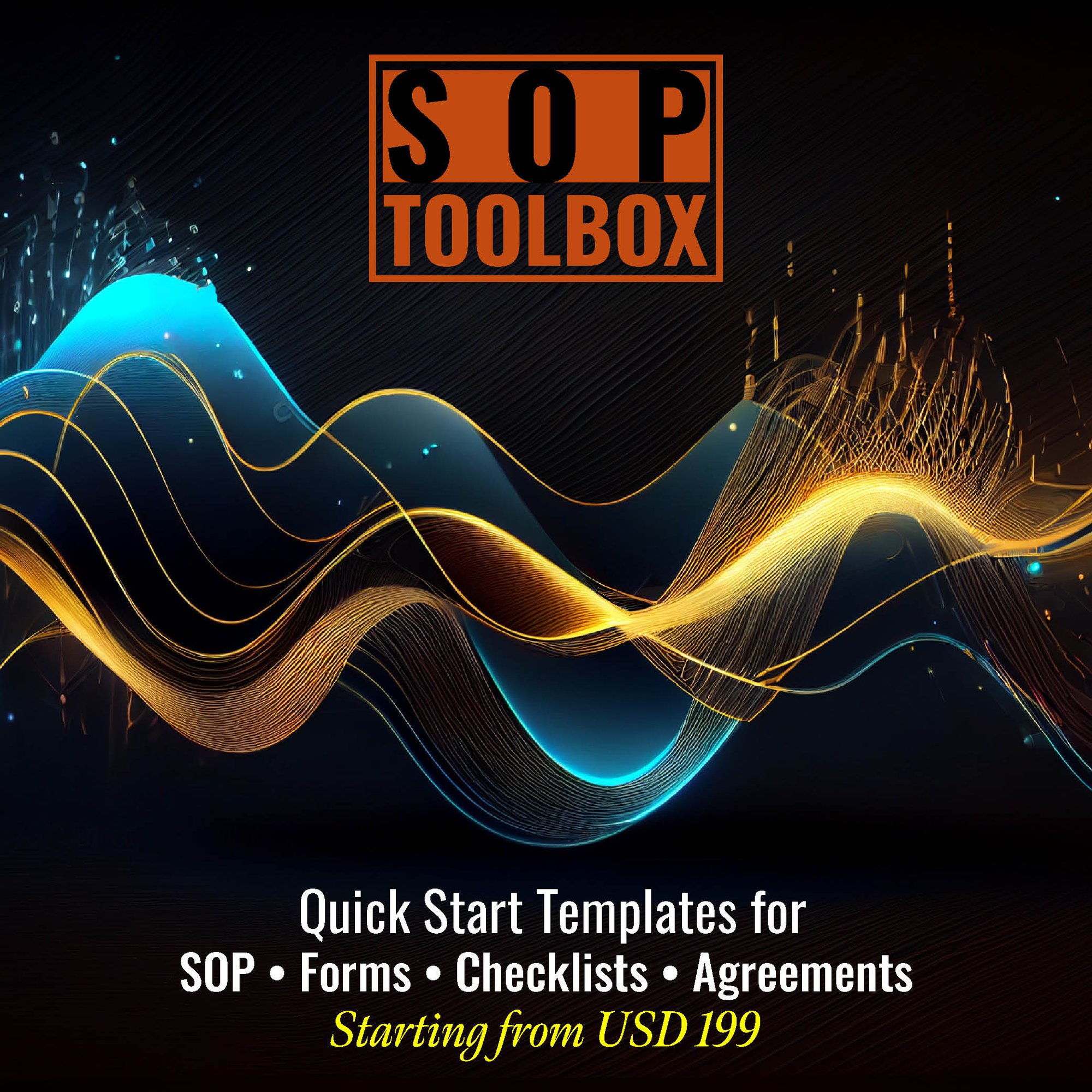The "All Other Miscellaneous Textile Product Mills SOP Manual" offers numerous advantages for manufacturers in the diverse textile product industry. Firstly, it establishes standardized procedures for textile product manufacturing, promoting operational consistency and efficiency. The manual serves as a crucial training resource, expediting onboarding processes and ensuring a uniform understanding of production protocols among employees. Additionally, it plays a vital role in quality control, guiding manufacturers in maintaining consistent product standards. By incorporating best practices, the SOP manual contributes to the development of high-quality and innovative textile products. It also addresses safety protocols, reducing the likelihood of accidents during manufacturing processes. Moreover, the manual aids in regulatory compliance, ensuring adherence to industry standards and legal requirements, thus minimizing liabilities. Overall, the "All Other Miscellaneous Textile Product Mills SOP Manual" provides a comprehensive guide to enhance operational excellence, product quality, safety standards, and regulatory compliance in the textile manufacturing sector.
CLICK HERE to download the List of SOPs Document in PDF format. Please share this document with your clients, colleagues and senior officers.
Top 50 Standard Operating Procedures (SOPs) for All Other Miscellaneous Textile Product Mills
SOP-210-001: Standard Operating Procedure for Facility Introduction and Overview
SOP-210-002: Standard Operating Procedure for Regulatory Compliance
SOP-210-003: Standard Operating Procedure for Quality Control Inspections
SOP-210-004: Standard Operating Procedure for Inventory Management
SOP-210-005: Standard Operating Procedure for Product Design and Development
SOP-210-006: Standard Operating Procedure for Raw Material Procurement
SOP-210-007: Standard Operating Procedure for Yarn Spinning Processes
SOP-210-008: Standard Operating Procedure for Weaving and Knitting Operations
SOP-210-009: Standard Operating Procedure for Dyeing and Finishing Processes
SOP-210-010: Standard Operating Procedure for Printing and Embroidery

SOP-210-011: Standard Operating Procedure for Cutting and Sewing
SOP-210-012: Standard Operating Procedure for Product Assembly
SOP-210-013: Standard Operating Procedure for Quality Assurance Testing
SOP-210-014: Standard Operating Procedure for Packaging and Labeling
SOP-210-015: Standard Operating Procedure for Order Processing
SOP-210-016: Standard Operating Procedure for Shipping and Distribution
SOP-210-017: Standard Operating Procedure for Returns and Exchanges
SOP-210-018: Standard Operating Procedure for Customer Service
SOP-210-019: Standard Operating Procedure for Sales and Marketing
SOP-210-020: Standard Operating Procedure for E-commerce Integration
SOP-210-021: Standard Operating Procedure for Product Catalog Management
SOP-210-022: Standard Operating Procedure for Supplier Relationship Management
SOP-210-023: Standard Operating Procedure for Environmental Compliance
SOP-210-024: Standard Operating Procedure for Waste Management
SOP-210-025: Standard Operating Procedure for Health and Safety Measures
SOP-210-026: Standard Operating Procedure for Employee Training and Development
SOP-210-027: Standard Operating Procedure for Facility Maintenance
SOP-210-028: Standard Operating Procedure for Equipment Calibration
SOP-210-029: Standard Operating Procedure for Emergency Response
SOP-210-030: Standard Operating Procedure for Fire Prevention and Control

SOP-210-031: Standard Operating Procedure for First Aid and Medical Response
SOP-210-032: Standard Operating Procedure for Employee Code of Conduct
SOP-210-033: Standard Operating Procedure for Equipment Maintenance
SOP-210-034: Standard Operating Procedure for Energy Efficiency Measures
SOP-210-035: Standard Operating Procedure for Product Innovation
SOP-210-036: Standard Operating Procedure for Research and Development
SOP-210-037: Standard Operating Procedure for Product Testing
SOP-210-038: Standard Operating Procedure for Market Research
SOP-210-039: Standard Operating Procedure for Price Optimization
SOP-210-040: Standard Operating Procedure for Supply Chain Management
SOP-210-042: Standard Operating Procedure for Budgeting and Expense Control
SOP-210-043: Standard Operating Procedure for Technology Integration
SOP-210-044: Standard Operating Procedure for Intellectual Property Protection
SOP-210-045: Standard Operating Procedure for International Trade Compliance
SOP-210-046: Standard Operating Procedure for Employee Safety Training
SOP-210-047: Standard Operating Procedure for Customer Satisfaction Surveys
SOP-210-048: Standard Operating Procedure for Continuous Improvement Initiatives
SOP-210-049: Standard Operating Procedure for Supplier Audits
SOP-210-050: Standard Operating Procedure for Facility Security Measures

.jpg?width=645&height=337&name=Standard%20Operating%20Procedure%20-%20SOP%20ToolBox%20(1).jpg)
SOP ToolBox: If you are reading these lines, I am sure you are looking for Standard Operating Procedure guidelines or SOPs itself. In both the cases, searching in internet will not be yielding any great help. Because no company shares their SOP Development Process and certainly don’t share their SOP Documents. The best way to develop an SOP is creating one for yourself. At Fhyzics, we write SOPs day-in and day-out for companies across the globe including some of the Fortune 500 organisations. Our charge ranges from USD 5000 to USD 50000 depending upon the number of processes to be covered. Certainly, this is not affordable to small and mid-size organisations. Hence, we decided to create this SOP ToolBox to disseminate our 8-Step SOP Development Life-Cycle and best practices at an unbelievably low price.
I always say, writing an SOP is somewhere between art and science. So far you may be clueless on where to start and how to progress on an SOP? This will not be the case after you diligently go through this SOP ToolBox. We have summarised all our secrets here to get you started and to deliver a stunning SOP to your management.
The North American Industry Classification System (NAICS) has grouped services and activities associated with All Other Miscellaneous Textile Product Mills under the NAICS industry code 314999. The following list shows some activities that are associated with industry 314999,
- Aircraft tie-down strap assemblies (except leather) manufacturing.
- Apparel fillings (e.g., cotton mill waste, kapok) manufacturing.
- Appliqueing on textile products.
- Art needlework contractors on apparel.
- Art needlework on clothing for the trade.
- Badges, fabric manufacturing.
- Bags, sleeping manufacturing.
- Banners made from purchased fabrics (except banner printing).
- Batts and batting (except nonwoven batting) manufacturing.
- Beading on textile products (except apparel) for the trade.
- Belting made from purchased fabrics.
- Bias bindings made from purchased fabrics.
- Binding carpets and rugs for the trade.
- Bows made from purchased fabrics.
- Burnt-out laces manufacturing.
- Carpet cuttinng and binding.
- Cotton battings ( except nonwoven batting) manufacturing.
- Crochet ware made from purchased materials.
- Decorative stitching contractors on apparel.
- Decorative stitching on textile articles and apparel.
- Diapers (except disposable) made from purchased fabrics.
- Dust cloths made from purchased fabrics.
- Embroidering contractors on apparel.
- Embroidering on textile products or apparel for the trade.
- Fiber, textile recovery from textlie mill waste and rags.
- fire hose, textile made from purchased materials.
- Fishing nets made from purchased materials.
- Garnetting textile waste and rags.
- Hammocks, fabric, manufacturing.
- Laundry nets made from purchased materials.
- Linings, casket, luggage manufacturing.
- Millitary insignia, textile manufacturing.
- Mill menders, contract woven fabrics.
- Novelty stitching contractors on apparel.
- Padding and wadding (except nonwoven fabric) manufacturing.
- Parachutes manufacturing.
- Powder puffs and mitts manufacturing.
- Quilting of textiles.
- Reclaimed wool processing.
- Recovered fibers processing.
- Ribbons made from fabrics.
- Stitching, decorative and novelty, on textile articles and apparel.
- Tassels manufacturing.
- Textile and hose made from purchased fabrics.
- Upholstering filling (except nonwoven fabric) manufacturing.
- Weatherstripping made from purchased textiles.
- Wool waste processing.
- The Textile Labour Association (TLA).
- The Madhya Pradesh Textile Mills Association (MPTMA).
- Ahamedabad Mills Owners Association (AMOA).
- ISO 20743: 2013
- ISO 9001: 2000
- ISO 9001: 2008
- Srg Global Inc | Troy | United State | www.srggi.com |
- Ascend Prfmce Mtls Hldings Inc | Houston | United State | www.ascendmaterials.com |
- Standard Textile Co Inc | Cincinnati | United State | www.standardtextile.com |
- Royal Ten Cate (usa) Inc | Pendergrass | United State | www.tencate.com |
- Irvin Acquisition LLC | Pontiac | United State | www.irvinproducts.com |
- ML Industries Inc | Fredericksburg | United State | www.mlindustries.org |
- Wm T Burnett Holding LLC | Baltimore | United State | www.williamburnett.com |
- Annin & Co | Roseland | United State | www.annin.com |
- Evergreen Enterprises Inc | Richmond | United State | www.myevergreen.com |
- Exxel Outdoors Inc | Haleyville | United State | www.exxel.com |
Our SOP Templates’ clients are from the following States and Countries:
Alabama, Alaska, Arizona, Arkansas, California, Colorado, Connecticut, Delaware, Florida, Georgia, Hawaii, Idaho, Illinois, Indiana, Iowa, Kansas, Kentucky, Louisiana, Maine, Maryland, Massachusetts, Michigan, Minnesota, Mississippi, Missouri, Montana, Nebraska, Nevada, New Hampshire, New Jersey, New Mexico, New York, North Carolina, North Dakota, Ohio, Oklahoma, Oregon, Pennsylvania, Rhode Island, South Carolina, South Dakota, Tennessee, Texas, Utah, Vermont, Virginia, Washington, West Virginia, Wisconsin, Wyoming.
Afghanistan, Albania, Algeria, Andorra, Angola, Antigua and Barbuda, Argentina, Armenia, Australia, Austria, Azerbaijan, Bahamas, Bahrain, Bangladesh, Barbados, Belarus, Belgium, Belize, Benin, Bhutan, Bolivia, Bosnia and Herzegovina, Botswana, Brazil, Brunei Darussalam, Bulgaria, Burkina Faso, Burundi, Cabo Verde, Cambodia, Cameroon, Canada, Central African Republic, Chad, Chile, China, Colombia, Comoros, Congo (Republic of the), Costa Rica, Croatia, Cuba, Cyprus, Czech Republic (Czechia), Democratic People’s Republic of Korea (North Korea), Democratic Republic of the Congo, Denmark, Djibouti, Dominica, Dominican Republic, Ecuador, Egypt, El Salvador, Equatorial Guinea, Eritrea, Estonia, Eswatini, Ethiopia, Fiji, Finland, France, Gabon, Gambia, Georgia, Germany, Ghana, Greece, Grenada, Guatemala, Guinea, Guinea-Bissau, Guyana, Haiti, Honduras, Hungary, Iceland, India, Indonesia, Iran, Iraq, Ireland, Israel, Italy, Jamaica, Japan, Jordan, Kazakhstan,Kenya, Kiribati, Kuwait, Kyrgyzstan, Lao People’s Democratic Republic (Laos), Latvia, Lebanon, Lesotho, Liberia, Libya, Liechtenstein, Lithuania, Luxembourg, Madagascar, Malawi, Malaysia, Maldives, Mali, Malta, Marshall Islands, Mauritania, Mauritius, Mexico, Micronesia (Federated States of), Moldova, Monaco, Mongolia, Montenegro, Morocco, Mozambique, Myanmar (Burma), Namibia, Nauru, Nepal, Netherlands, New Zealand, Nicaragua, Niger, Nigeria, North Macedonia (formerly Macedonia), Norway, Oman, Pakistan, Palau, Panama, Papua New Guinea, Paraguay, Peru, Philippines, Poland, Portugal, Qatar, Republic of Korea (South Korea), Republic of the Congo, Romania, Russian Federation (Russia), Rwanda, Saint Kitts and Nevis, Saint Lucia, Saint Vincent and the Grenadines, Samoa, San Marino, Sao Tome and Principe, Saudi Arabia, Senegal, Serbia, Seychelles, Sierra Leone, Singapore, Slovakia, Slovenia, Solomon Islands, Somalia, South Africa, South Sudan, Spain, Sri Lanka, Sudan, Suriname, Sweden, Switzerland, Syrian Arab Republic (Syria), Tajikistan, Thailand, Timor-Leste, Togo, Tonga, Trinidad and Tobago, Tunisia, Turkey, Turkmenistan, Tuvalu, Uganda, Ukraine, United Arab Emirates, United Kingdom of Great Britain and Northern Ireland, United Republic of Tanzania, United States of America, Uruguay, Uzbekistan, Vanuatu, Venezuela, Viet Nam, Yemen, Zambia, Zimbabwe.
Fhyzics supports organisations in developing the following documentations:
Standard Operating Procedures (SOPs), Work Instructions, Policies and Procedures, Process Flow Diagrams, Job Descriptions, Training Manuals, Employee Handbooks, Compliance Guidelines, Quality Assurance Manuals, Health and Safety Procedures, Risk Management Plans, Business Continuity Plans, Internal Audit Procedures, Incident Reporting Forms, Performance Management Guidelines, Change Management Procedures, Vendor Management Guidelines, Customer Service Protocols, IT Security Policies, IT Support Documentation, Disaster Recovery Plans, Operational Checklists, Data Management Policies, Confidentiality Agreements, Non-Disclosure Agreements, Employee Onboarding Procedures, Employee Exit Procedures, Performance Appraisal Forms, Employee Code of Conduct, Conflict Resolution Procedures, Product Development SOPs, Supply Chain Management Guidelines, Procurement Guidelines, Inventory Management SOPs, Shipping and Receiving Procedures, Production Scheduling SOPs, Maintenance Procedures, Equipment Calibration Documents, Environmental Compliance Documentation, Sustainability Policies, Customer Feedback Forms, Marketing Strategies, Advertising Guidelines, Brand Management Guidelines, Product Packaging SOPs, Laboratory Testing Procedures, Regulatory Compliance Documentation, Tax and Accounting Procedures, Contract Management Procedures, Legal Compliance Guidelines, Financial Reporting Procedures, Budgeting Procedures, Internal Control Procedures, Fraud Prevention Policies, Asset Management Guidelines, Purchase Order Procedures, Sales and Distribution Guidelines, Client Contracts, Customer Return Policies, Internal Communication Protocols, Vendor Evaluation Forms, Product Safety Standards, Workplace Health and Safety Standards, Public Relations Procedures, Social Media Management Guidelines, Crisis Management Plans, Employee Grievance Procedures, Privacy and Data Protection Policies, Digital Transformation Guidelines, Innovation Management Procedures, Continuous Improvement Guidelines, Strategic Planning Documents, Corporate Social Responsibility (CSR) Guidelines, Audit Trails and Records, Employee Training and Development Records, Succession Planning Documents, Talent Acquisition Procedures, Team Collaboration Protocols, Employee Benefit Plans, Workplace Diversity Guidelines, Time and Attendance Tracking, Payroll Procedures, Employee Leave Policies, Conflict of Interest Policy, Emergency Response Procedures, Environmental Impact Assessment Procedures, Transportation and Logistics Procedures, Inventory Control Forms, Warehouse Management Guidelines, Product Lifecycle Management SOPs, Customer Satisfaction Surveys, Third-Party Risk Assessment Guidelines, Technology Adoption Policies, Software Licensing Guidelines, Security Incident Response Procedures, Supply Chain Risk Management Policies, Product Recall Procedures, Food Safety Guidelines, Employee Wellness Programs, Workplace Ergonomics Guidelines.
















